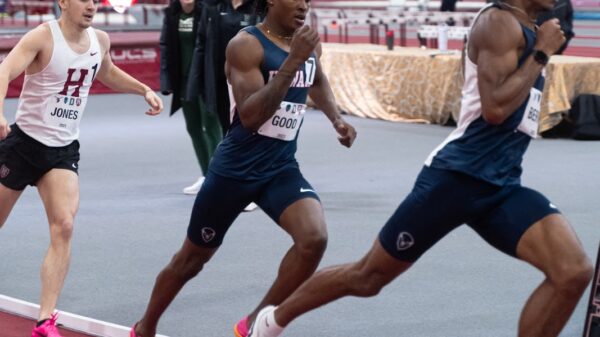Jackson State head football coach Deion Sanders set social media on fire in October during a postgame interview following his team’s win against Alabama State. Sanders responded to an assertion made by Alabama State head football coach Eddie Robinson that he is not Southwestern Athletic Conference (SWAC) material and does not embody or represent what the conference is made of by rhetorically asking “Who is SWAC, if I ain’t SWAC?” Weeks later it appears Sanders no longer wishes to be apart of SWAC and will leave Jackson State behind for the University of Colorado Boulder following the Celebration Bowl.
Stop saying we are hating on Deion Sanders
In the time since the announcement was made that Sanders is headed to Colorado, I have had the opportunity to take in all of the instant reactions across social media. Many people are upset with Sanders for leaving Jackson State, and some are celebrating the fact that a Black man is being given the opportunity to be a Power Five head football coach. Additionally, there are those in support of Sanders that have come out bashing anyone upset at the head coach for leaving Jackson State. Professional Football Hall of Fame tight end Shannon Sharpe argued, “Jackson State should be excited for Deion, he gave you a blueprint for what you could be… for what you could become.”
The issue with stances like this is that they ignore the fact that Sanders’ situation is absolutely one of one and is not some sort of blueprint that can be replicated. Regardless of race, nobody could have walked into a division one head coaching job with just three years of high school coaching under their belt. Surely, nobody else could have gone from coaching for three years at Jackson State to immediately becoming the head coach at a Power Five program.
No, Sanders didn’t lay the blueprint for what Jackson State needs to do in the future because nobody else has the charisma, the cache or the connections that Sanders does. No, Black people aren’t mad that a Black man moved into a higher paid, higher stakes position. People are upset that he moved after making himself the leader and the face of the movement to progress HBCU athletics. Now, many feel like they’ve been duped by the great salesman Sanders and, as ESPN’s Bomani Jones said, “He sold a dream and then walked out on the dream. People have the right to be critical of that.”
In it for himself all along
Reports of Sanders’ departure came as a gut-punch to many, but it was expected by most football fans. Sanders was open about the fact that he would entertain potential Power Five head coaching opportunities, but statements like, “(Jackson State) is a match made in heaven,” gave people hope that Sanders would at least stick it out long enough to see one student that he recruited out of high school graduate from the program.
With Sanders at Jackson State, interest in HBCU Division One football peaked. Attendance at Jackson State games skyrocketed, live nationally televised games became a regular occurrence and high-profile recruits elected to attend HBCUs at a clip that hasn’t been reached this century. As Sanders moves on from Jackson State, the reality is that the attention and respect that he brought to HBCU athletics might revert to the unsatisfying levels at which they sat prior to his stint at JSU.
In an interview with 60 Minutes, Sanders claimed that following the tragic George Floyd incident, God called him to Jackson State to “…change lives, change the perspective of HBCU football, make everyone step up to the plate and do what is right by these kids.” Now that Sanders has left while there is still so much work to be done in achieving the goals that he laid out, it makes people wonder – did Sanders coach at Jackson State for a cause or because it was the most convenient of the few opportunities he had on the table? Was Jackson State simply the easiest opportunity for his son Shedeur to walk into a starting quarterback job while Sanders was able to pull all of the strings as head coach?
Jackson State left in the dust
Nicknamed “Prime Time” during his playing career, Sanders has always had a gravity about him that demands attention and respect. He brought this to HBCU football, and as JSU’s President Jackson Hunter estimated, “If you talk about the social media impact and just a publicity impact, it’s in the 10’s of millions.”
Unfortunately, for the program he leaves behind, the publicity comes and goes as Sanders does.
Not only does Sanders’ departure leave Jackson State and HBCU athletics hanging high and dry, it leaves many of the highly touted players that signed on to the program because of Sanders uncertain about their futures. Sanders held a team meeting following the announcement where he discouraged his players from entering the transfer portal; the very means by which he acquired several of those players. Now players that signed on for Sanders and the dream that he sold, and then abandoned, will have to scramble and quickly figure out their next steps.
Losing the “Coach Prime Effect”
The impact was real. Sanders pulling strings to get Jackson State football games nationally televised meant that Jackson State, and their SWAC opponent would get that exposure. The halftime show, the players’ stories, the coaches’ stories and the program history would be on display for millions to see throughout the broadcast. As people followed the SWAC, it brought attention to the MEAC, as the fans followed throughout the season to see who would clash in the Celebration Bowl to compete for the HBCU National Championship. Youtube highlight reels of each Jackson State game went viral as fans were eager to see what the top recruits that Sanders signed would do against SWAC competition. Sanders’ presence was such a big deal that pregame speeches and postgame chatter between him and other coaches would go viral!
The last gasp
Sanders leaving and taking the Coach Prime effect with him feels like a pulling of the plug on what might have been the last chance to level the playing field between Division One HBCUs and FBS programs. In title, “Coach Prime” as he calls himself was only the head football coach at Jackson State. In stature, he made himself the face and the leader of a movement. That movement might just end with his departure from Jackson State. How can coaches sell recruits on attending HBCUs for the culture, history and potential impact of choosing schools with more resources when not even the face of HBCU athletics could remain committed to the program over the temptation of a more wealthy school? Sanders made headlines flipping number one recruit Travis Hunter from Florida State earlier this year as well as many transfers from Power Five programs which caused rumblings around the country that recruits choosing HBCUs over PWIs would soon become the norm. As many of Sanders’ recruits will likely transfer and heads will turn away from HBCU football, it seems as though this dream is dying.
Dear HBCUs, big names won’t bridge the gap
As Sanders moves on, it is time for HBCUs to move on to a different strategy for establishing relevance and a higher standard. Too often, a figure will use HBCU athletics to prop themselves up while making it seem as though they are benefiting HBCUs as a whole and then move on leaving HBCUs behind in the same condition in which they found them. The problem is that the community keeps falling for this trick and props the person up as the leader or the savior every single time.
ESPN five star recruit Makur Maker made national headlines as he became the highest ranked basketball prospect to commit to a HBCU since the ESPN recruiting database started in 2007. Many became excited for what that commitment would inspire in years to come as far as college basketball players choosing HBCUs. Years have passed and not only has nothing close to a pattern of highly ranked basketball players choosing HBCUs has come to fruition but Makur himself only played two games for Howard before shutting it down for the season and moving on to his next destination.
Superstar youth basketball prodigy Mikey Williams grabbed headlines in 2020 as well when he flooded his instagram story with HBCU content, and made a lengthy caption on a now-deleted post that included lines such as “I am riding for my people! Any way I can help or make a change in the Black community best believe I am going to do that,” and “But when that time does come that I have to narrow my schools down to whatever number it is…there WILL be multiple HBCU’s on that list. And they won’t just be there for show.”
Two years passed, the time came, and Williams reportedly did not visit a single HBCU before committing to the University of Memphis. Again, many were hopeful as they applauded Mikey for having the courage to start a movement and seriously consider attending an HBCU. Not only was a movement not started, but in the two years since the Black college conversation helped boost Williams’ fame, Williams has seldom mentioned HBCUs. In fact, when he was listing his top five schools on the I am Athlete podcast, Williams quickly listed the G-league and a couple of PWIs as his top choices before seemingly remembering that he previously acted like he wanted to attend an HBCU. Williams did not name a single HBCU that he was considering, as he said “It’s a few of them (HBCUs) that I’m considering.”
Hopefully, the most recent case of Black sports figures using HBCUs to gain headlines and then moving on featuring Sanders will teach everyone that big names attaching themselves to the culture are not what will bridge the gap between HBCUs and PWIs – especially because history teaches that these big names will probably leave HBCUs behind within months.
While it’s hard to find positives in Sanders’ departure as it relates to HBCU athletics, his new position can be seen as a big step forward for Black coaches getting head coaching roles in college football. Per ESPN.com, there were only eight Black head football coaches across all of the Power Five conferences as of August 2022. The more Black coaches that can infiltrate that space and do well, the more opportunities Black coaches are likely to receive.
The thing is that Sanders took a path that can’t be replicated by other Black coaches. There is only one Sanders, and only that one Sanders could have gone from three seasons coaching at Jackson State to a head coach position at a Power Five program. It was better for HBCUs when Sanders was doing one of a kind, unduplicatable things at an HBCU, benefiting HBCUs.
Copy edited by Chanice McClover-Lee













